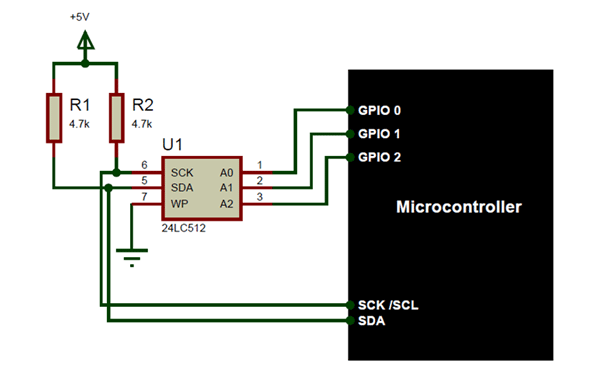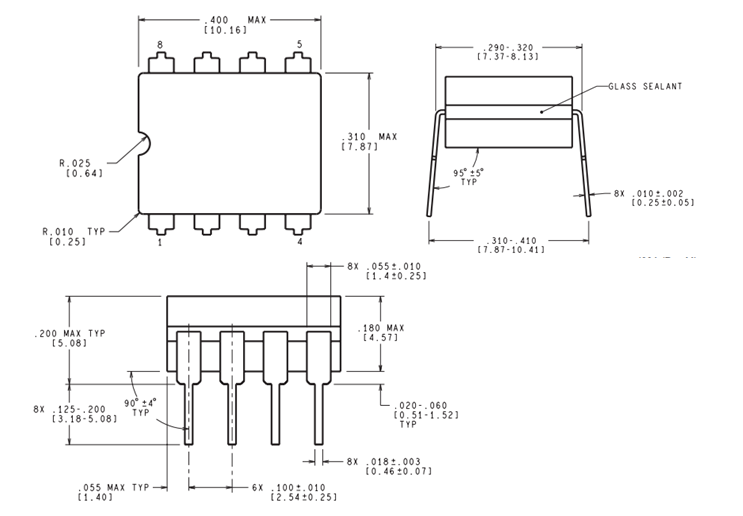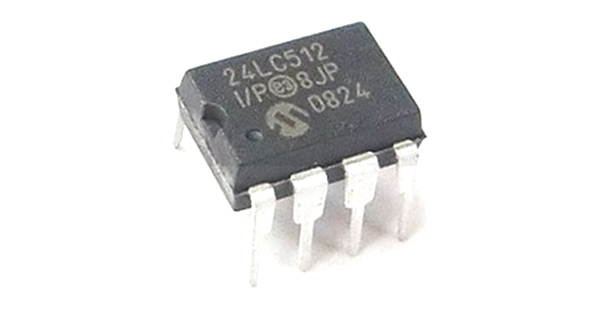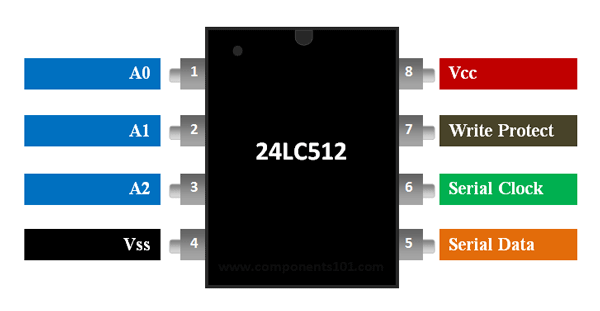24LC512 EEPROM IC
24LC512 Pin Configuration
|
Pin Number |
Pin Name |
Description |
|
1,2,3 |
A0,A1,A2 |
User configured Chip Select pins, useful during cascading |
|
4 |
Vss (Ground) |
Connected to the ground of the circuit |
|
5 |
Serial Data (SDA) |
Serial Data pin for I2C Communication |
|
6 |
Serial Clock (SCL) |
Serial Clock pin for I2C Communication |
|
7 |
Write-Protect |
If connected to Vss write is enabled, if connected to Vcc write is disabled. |
|
8 |
Vcc |
Connect to supply rail |
24LC512 IC Specifications
- 512K EEPROM IC
- (64×8) gives 512 K of memory
- 128-byte page write buffer
- Operating Voltage: 1.8V to 5.5V
- Read current: 40uA
- Communication: I2C
- Write cycle time: 5ms
- 100kHz to 400KHz clock compatible
- 10,00,000 read/write cycles
- Can cascade upto 8 devices
- Available in 8-pin DIP, SOIJ, SOIC and TSSOP packages.
Note: Complete technical information can be found in the 24LC512 Datasheet linked at the bottom of this page.
24LC512 Equivalent IC
Alternatives EEPROM’S
24C04, 24LC1026, 25LC040, 24C32
Where to Use the 24LC512 EEPROM
The 24LC512 is a 512 Kilo Bit, 8-pin EEPROM IC. As we know EEPROM stands for Electrically Erasable Programmable Read-Only Memory, we can store information on this IC and it will remain there even when the power is turned off just like your pen drive. Then the information can be retrieved or over-written when required.
It has a wide operating voltage range from 1.7V to 5.5V, which makes it ideal to be used both for 3.3V systems and 5V systems. Each IC comes with a storage space of 512Kb and can be cascaded with 8 similar IC if expansion is required. The IC works with help of 2-wire protocol (IIC/I2C) and hence it is easy to interface with most of the MCU’s and consumes less number of pins. Also the Read current for the IC is only 40uA which makes it ideal for battery operated applications.
So if you are looking for an EEPROM IC with storage of 512KB and works on I2C then this IC might be the right choice for you. Read the 24LC512 datasheet at the bottom to know more about the IC.
How to use 24LC512 EEPROM IC
The 24LC512 EEPROM IC communicates with help of I2C protocol. To interface it with a MCU just power the IC (usually with 3.3V or 5V) and connect the communication lines as shown below.

The Serial Clock SCK (pin 6) is connected to the Serial clock pin of the microcontroller and the Serial Data SDA (pin 5) is connected to the Serial Data pin of the microcontroller. Also like all I2C communication we have pulled the SCK and SDA line high using two pull-up resistors or while 4.7k. This will keep the bus at high state during idle condition.
Other than that we have three chip select pins namely A0, A1, and A2. These three pins are useful only if more than one I2C device or EEPROM is connected to the same microcontroller, else three pins can be grounded directly. In the above diagram we have connected the three pins to the GPIO pins so that we can cascade more than one EEPROM IC if required.
The Write Protect WP (pin 7) is provided for improving data security in the IC. The data can be written or erased on the EEPROM only if the WP pin is held low (logic 0). Else the data written on the EEPROM will remain as such. Normally this pin will be grounded (logic 0) when the protection is note needed. Data can be read from the EEPROM at all conditions irrespective of the status of the WP pin.
Once the communication is successful, the MCU can be programmed to read/write data to the EEPROM by calling the right register values. First the address of the location to which the data must be read/written should be specified followed by the data. Normally this is how data will be read/written byte by byte. The 24LC512 IC provides an option called page write which allows the user to write 128-bytes of data continuously without mention the address of each data. Read the data sheet at the end of the page to know more on how to communicate with the IC.
Applications
- Data Logging
- Audio devices
- Remote storage devices
- Data analytics
- Storage devices
- Used where Flash memory of MCU is less
2D-Model and Dimensions











